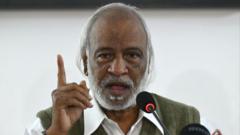A 22-member delegation from Bangladesh, including politicians, civil society activists, and journalists, has embarked on a significant 10-day visit to China. This initiative aims to foster stronger diplomatic ties and was confirmed by delegation leader Abdul Moyeen Khan to the BBC. Analysts suggest this visit comes at a time of increasing tension between Bangladesh and India, primarily surrounding the controversial status of former Bangladeshi leader Sheikh Hasina, who is currently living in exile in India after being ousted from power.
During this goodwill trip, initiated by Beijing, the delegation holds discussions with Chinese government officials and Communist Party members. Notably, many delegates represent the Bangladesh Nationalist Party (BNP) and their coalition partners, reflecting the political realignment in Bangladesh following Hasina’s departure. The interim government led by Nobel laureate Muhammad Yunus has been vocally requesting India to extradite Hasina, though New Delhi has yet to acquiesce, with strong denials coming from Hasina herself.
The delegation's composition underscores a shift in Bangladesh’s political dynamics, marked by the presence of student movement representatives who played pivotal roles in the protests leading to Hasina’s overthrow in August. Amid this backdrop, China has increased its engagements with various Bangladeshi factions, utilizing the political void left by Hasina’s ousting to solidify its influence in a country of approximately 170 million people.
China currently stands as Bangladesh’s largest trading partner, with bilateral trade valued at about $24 billion. The dependency of the Bangladeshi military on Chinese military supplies, constituting over 70% of its procurement, further cements Beijing’s strategic significance in the region.
In contrast, relationships between India and the interim Bangladeshi government appear to be deteriorating. The BNP accused India of interfering in Bangladeshi politics, sparking a strong defensive response from the Indian government, which emphasized that the nature of its relationship with Bangladesh should be determined by Dhaka, not legislated from Delhi. As South Asian nations such as Sri Lanka, the Maldives, and Nepal navigate the competing influences of China and India, Bangladesh's movement towards enhanced ties with China may symbolize a broader regional shift in alliances and power dynamics.





















